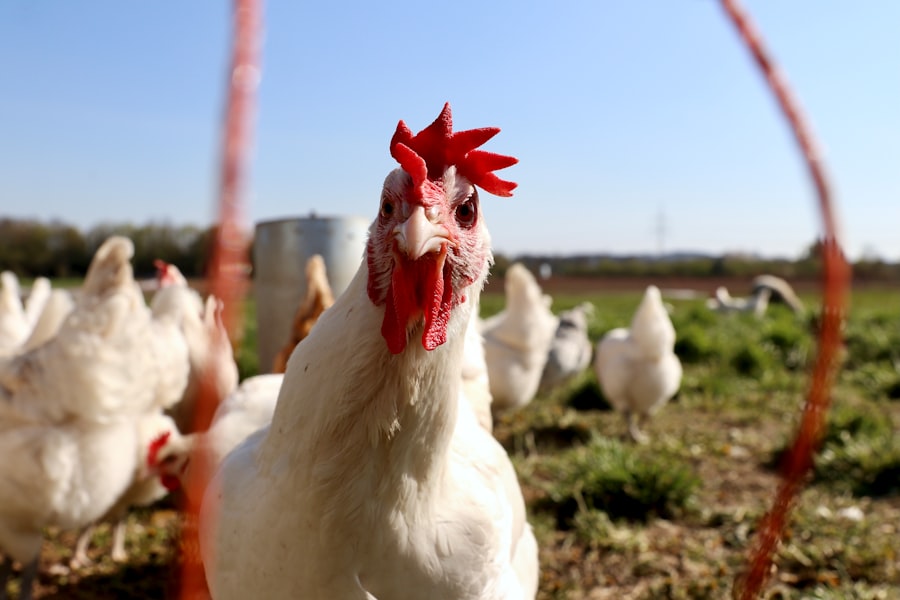Bears are natural predators that can pose a significant threat to chickens and other small livestock. Their powerful jaws and sharp claws enable them to easily break into chicken coops and harm the birds inside. Bears are intelligent animals, and once they discover a food source like chickens, they are likely to return, leading to repeated attacks and potential loss of livestock.
Bears are attracted to the scent of chickens and their feed, making chicken coops a target in areas where bears are present. Even if a bear does not initially attack, its presence can stress the chickens, potentially decreasing egg production and overall health. As opportunistic feeders, bears will take advantage of any accessible food source.
Chicken coops are particularly vulnerable, as they often contain not only chickens but also feed and other supplies that can attract bears. Once a bear identifies a chicken coop as a food source, it may continue to return, posing an ongoing threat to the chickens and the coop’s security. It is essential for chicken owners to understand the potential danger bears pose to their flocks and take proactive measures to protect their chickens from these powerful predators.
Implementing proper security measures and deterrents is crucial to ensure the safety of the chickens and maintain the integrity of the coop.
Table of Contents
- 1 Implementing physical barriers: How to secure your chicken coop from bear attacks
- 2 Utilizing scent deterrents: Methods for repelling bears with strong odors
- 3 Installing motion-activated lights and alarms: Using technology to scare off bears
- 4 Proper food storage: Preventing bears from being attracted to chicken feed
- 5 Creating a bear-safe environment: Tips for maintaining a bear-resistant property
- 6 What to do in case of a bear encounter: Safety measures for dealing with bears near your chickens
- 7 FAQs
- 7.1 What are some effective ways to keep bears away from chickens?
- 7.2 Why is it important to keep bears away from chickens?
- 7.3 What are some signs that bears may be targeting chickens?
- 7.4 Are there any natural deterrents that can keep bears away from chickens?
- 7.5 What should I do if I encounter a bear near my chicken coop?
Key Takeaways
- Bears pose a danger to chickens due to their natural predatory instincts and attraction to easy food sources.
- Secure your chicken coop from bear attacks by installing electric fencing, sturdy locks, and reinforced doors and windows.
- Repel bears with strong odors such as ammonia, vinegar, or predator urine around the perimeter of the coop.
- Use motion-activated lights and alarms to startle and scare off bears when they approach the chicken coop.
- Prevent bears from being attracted to chicken feed by storing it in bear-resistant containers and keeping the area clean of spilled food.
- Maintain a bear-resistant property by removing attractants like garbage, bird feeders, and fallen fruit, and keeping the area well-lit and clear of hiding spots.
- In case of a bear encounter, stay calm, make yourself look big, and slowly back away without turning your back on the bear. If attacked, fight back with whatever is available.
Implementing physical barriers: How to secure your chicken coop from bear attacks
Securing the Chicken Coop
One of the most effective ways to protect your chickens from bear attacks is by implementing physical barriers around the chicken coop. This can include installing sturdy fencing around the perimeter of the coop, as well as reinforcing the structure of the coop itself to make it more difficult for bears to break in. Using heavy-duty materials such as metal or thick wood can help prevent bears from easily gaining access to the coop, reducing the risk of an attack on the chickens.
Securing Outdoor Areas
In addition to securing the coop itself, it is important to also secure any outdoor areas where chickens may roam. This can be done by creating a secure outdoor enclosure for the chickens, using strong fencing and a secure gate to prevent bears from entering the area. By creating a secure space for the chickens to roam, you can reduce the risk of them coming into contact with bears and minimize the potential for an attack on the flock.
Electric Fencing: An Added Layer of Protection
Another important physical barrier to consider is installing electric fencing around the perimeter of the chicken coop. Electric fencing can be an effective deterrent for bears, as it delivers a mild electric shock when touched, discouraging bears from attempting to break into the coop. When properly installed and maintained, electric fencing can provide an added layer of protection for your chickens and help prevent bear attacks on your property.
Utilizing scent deterrents: Methods for repelling bears with strong odors

Scent deterrents can be an effective way to repel bears from your property and protect your chickens from potential attacks. Bears have a strong sense of smell and are often deterred by strong odors that they find unpleasant. By strategically using scent deterrents around your chicken coop, you can help discourage bears from targeting your flock and reduce the risk of an attack on your chickens.
One common scent deterrent for bears is ammonia. By placing ammonia-soaked rags or cotton balls around the perimeter of the chicken coop, you can create a strong odor that is unpleasant for bears and may deter them from approaching the area. It is important to regularly refresh the ammonia-soaked items to maintain their effectiveness and continue repelling bears from your property.
Another effective scent deterrent for bears is pepper spray. By spraying pepper spray around the perimeter of the chicken coop, you can create a strong odor that is irritating to bears’ sensitive noses, discouraging them from approaching the area. It is important to use caution when using pepper spray, as it can be harmful if it comes into contact with humans or other animals.
However, when used properly, pepper spray can be an effective tool for repelling bears and protecting your chickens from potential attacks. Additionally, using natural scents such as citrus or cinnamon can also help deter bears from approaching your property. By placing citrus peels or cinnamon sticks around the chicken coop, you can create a pleasant but strong odor that may discourage bears from targeting your flock.
These natural scents are safe for both humans and animals and can be an effective way to repel bears from your property without causing harm to the environment.
Installing motion-activated lights and alarms: Using technology to scare off bears
Motion-activated lights and alarms can be an effective way to scare off bears and protect your chickens from potential attacks. Bears are often wary of sudden noises and bright lights, making motion-activated devices a useful tool for deterring them from approaching your property. By installing motion-activated lights and alarms around your chicken coop, you can create a deterrent that may discourage bears from targeting your flock and reduce the risk of an attack on your chickens.
Motion-activated lights are a simple yet effective way to scare off bears and other potential predators. By installing bright lights around the perimeter of the chicken coop that are triggered by motion, you can startle bears and discourage them from approaching the area. This can be particularly effective at night when bears are more active and may be more likely to target your chickens.
Motion-activated lights can help create a sense of insecurity for bears, making them less likely to attempt an attack on your flock. In addition to motion-activated lights, installing motion-activated alarms around your chicken coop can also help scare off bears and protect your chickens from potential attacks. These alarms are triggered by motion and emit a loud noise when activated, which can startle bears and discourage them from approaching the area.
The sudden noise can create a sense of danger for bears, making them more likely to retreat from your property rather than risk encountering a potential threat. Furthermore, combining motion-activated lights with alarms can provide an even greater deterrent for bears. The combination of bright lights and loud noises can create a strong deterrent that may discourage bears from targeting your flock and reduce the risk of an attack on your chickens.
By using technology to scare off bears, you can help protect your chickens from potential harm and create a safer environment for your livestock.
Proper food storage: Preventing bears from being attracted to chicken feed
Proper food storage is essential for preventing bears from being attracted to chicken feed and targeting your flock. Bears are attracted to the scent of food, including chicken feed, making it important to store feed in a way that is secure and inaccessible to bears. By properly storing chicken feed, you can reduce the likelihood of attracting bears to your property and minimize the risk of an attack on your chickens.
One effective method for storing chicken feed is by using bear-resistant containers. These containers are designed to be sturdy and difficult for bears to break into, helping prevent them from accessing the feed inside. By storing feed in bear-resistant containers, you can reduce the risk of attracting bears to your property and protect your chickens from potential harm.
Another important consideration for proper food storage is keeping feed in a secure location that is not easily accessible to bears. This may involve storing feed in a locked shed or other secure structure that is not easily penetrated by bears. By keeping feed in a secure location, you can reduce the likelihood of attracting bears to your property and minimize the risk of an attack on your chickens.
Additionally, it is important to clean up any spilled feed or food scraps around the chicken coop, as these can also attract bears to your property. By regularly cleaning up around the coop and ensuring that no food is left out in the open, you can help reduce the likelihood of attracting bears and protect your chickens from potential harm. Proper food storage is essential for preventing bears from being attracted to chicken feed and minimizing the risk of an attack on your flock.
Creating a bear-safe environment: Tips for maintaining a bear-resistant property

Secure Attractants and Reduce the Risk of Attraction
Creating a bear-safe environment is essential for maintaining a bear-resistant property and protecting your chickens from potential harm. This involves taking proactive measures to reduce the likelihood of attracting bears to your property and minimizing the risk of an attack on your flock. By implementing these tips for maintaining a bear-resistant property, you can create a safer environment for your livestock and reduce the potential danger posed by bears.
One important tip for creating a bear-safe environment is keeping garbage and other attractants secured in bear-resistant containers. Bears are attracted to human food sources, including garbage, compost, and pet food, making it important to keep these items stored in a way that is inaccessible to bears. By securing garbage and other attractants in bear-resistant containers, you can reduce the likelihood of attracting bears to your property and minimize the risk of an attack on your chickens.
Remove Potential Food Sources
Another key aspect of creating a bear-safe environment is removing any potential food sources that may attract bears. This may involve cleaning up fallen fruit from trees, securing bird feeders, and removing any other sources of food that could attract bears to your property. By eliminating potential food sources, you can reduce the likelihood of attracting bears and protect your chickens from potential harm.
Maintain Physical Barriers
Additionally, it is important to regularly inspect and maintain physical barriers such as fencing and electric fencing around your property. This may involve repairing any damage or weak spots in the fencing, as well as ensuring that electric fencing is properly functioning. By maintaining physical barriers around your property, you can reduce the likelihood of bears gaining access to your chickens and minimize the risk of an attack on your flock.
What to do in case of a bear encounter: Safety measures for dealing with bears near your chickens
In the event of a bear encounter near your chickens, it is important to take safety measures to protect yourself and your livestock from potential harm. Bears are powerful animals that can pose a significant threat if they feel threatened or provoked, making it important to approach encounters with caution and follow proper safety protocols. By following these safety measures for dealing with bears near your chickens, you can help ensure the safety of yourself and your livestock in the event of an encounter.
One important safety measure for dealing with bears near your chickens is avoiding direct confrontation with the bear. If you encounter a bear near your property, it is important to remain calm and avoid making sudden movements or loud noises that could startle or provoke the bear. Instead, slowly back away from the bear while keeping an eye on its movements, allowing it space to retreat without feeling threatened.
Another key safety measure is making loud noises or using bear deterrents such as air horns or pepper spray to scare off the bear. If a bear approaches your property or shows interest in your chickens, using loud noises or deterrents can help startle the bear and encourage it to retreat from the area. It is important to use these deterrents cautiously and only when necessary, as they can be harmful if misused.
Additionally, it is important to report any bear encounters or aggressive behavior to local wildlife authorities. If you have had a bear encounter near your property or if you feel that there is a potential threat to yourself or your livestock, it is important to report this information to wildlife authorities so that they can take appropriate action. By reporting bear encounters, you can help ensure that proper measures are taken to address any potential threats posed by bears in your area.
In conclusion, understanding the threat that bears pose to chickens is essential for protecting your flock from potential harm. By implementing physical barriers such as fencing and electric fencing, utilizing scent deterrents such as ammonia or pepper spray, installing motion-activated lights and alarms, properly storing chicken feed, creating a bear-safe environment, and following safety measures for dealing with bear encounters near your chickens, you can help ensure the safety of your livestock and minimize the risk of an attack by these powerful predators.
If you’re looking for ways to keep bears away from your chickens, you may want to check out this article on PoultryWizard. They offer tips and advice on how to protect your chickens from predators, including bears. From converting a shed into a chicken coop to interior design ideas for the coop, PoultryWizard has you covered.
FAQs
What are some effective ways to keep bears away from chickens?
Some effective ways to keep bears away from chickens include installing electric fencing, using motion-activated lights or sound deterrents, securing chicken coops with sturdy locks, and removing any potential food sources that may attract bears.
Why is it important to keep bears away from chickens?
It is important to keep bears away from chickens to protect the safety of both the chickens and the humans who care for them. Bears can pose a threat to the well-being of chickens and can also cause property damage.
What are some signs that bears may be targeting chickens?
Signs that bears may be targeting chickens include evidence of attempted entry into chicken coops, missing or injured chickens, and tracks or scat near the chicken coop.
Are there any natural deterrents that can keep bears away from chickens?
Some natural deterrents that can help keep bears away from chickens include planting strong-smelling herbs or flowers around the chicken coop, such as lavender or mint, and using ammonia-soaked rags or predator urine to create a scent barrier.
What should I do if I encounter a bear near my chicken coop?
If you encounter a bear near your chicken coop, it is important to remain calm and avoid direct confrontation. Back away slowly and make loud noises to try to scare the bear away. It is also important to report the bear sighting to local wildlife authorities.
Meet Walter, the feathered-friend fanatic of Florida! Nestled in the sunshine state, Walter struts through life with his feathered companions, clucking his way to happiness. With a coop that’s fancier than a five-star hotel, he’s the Don Juan of the chicken world. When he’s not teaching his hens to do the cha-cha, you’ll find him in a heated debate with his prized rooster, Sir Clucks-a-Lot. Walter’s poultry passion is no yolk; he’s the sunny-side-up guy you never knew you needed in your flock of friends!







